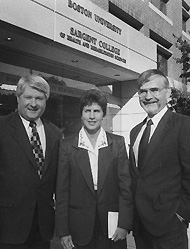![]()
Departments
![]()

|
Week of 24 September 1999 |
Vol. III, No. 7 |
Feature
Article
SAR receives $3.5 million grant for rehabilitation research and training
By Eric McHenry
Thanks to a $3.5 million grant from the Department of Education (DOE), BU is setting up a center devoted to the study of treatments for such afflictions as strokes, hip fractures, severe joint problems, and traumatic spinal cord injuries.
Traditionally, treatment providers have gauged the effectiveness of their methods by trial and error over short time periods and in specific settings. The Rehabilitation Research and Training Center (RRTC), housed in the Center for Rehabilitation Effectiveness (CRE) at Sargent College of Health and Rehabilitation Sciences, will be unique in its more comprehensive approach to assessment of treatments. Researchers will observe patients in a wide variety of therapeutic environments, and will compile and interpret data from facilities across the country.
|
|
|
Stephen Haley, left, Pat Andres,
and Alan Jette of Sargent College are using a $3.5
million grant from the Department of Education to
establish a Rehabilitation Research and Training
Center. Photo by Vernon
Doucette
|
"It's all patient-centered," he says. "We're going to develop standardized instruments that can be used by practitioners to try to gauge how patients are functioning and improving.
"In one study," he says, "which will probably start in our third year, we'll enroll patients who have suffered either a stroke, hip fracture, traumatic spinal cord injury, or had joint replacement. And we will follow them throughout their recovery process, wherever they go -- hospital, nursing home, home care, wherever. It's entirely observational. We're going to try to track what kind of improvements occur and identify the reasons why."
The grant, conferred by the DOE's National Institute on Disability and Rehabilitation Research (NIDRR), recognized the merit of a proposal co-written by BU scholars and their colleagues at three other institutions: the National Rehabilitation Hospital in Washington, D.C., the Institute for Clinical Outcomes Research in Salt Lake City, and the Health Assessment Laboratory at Boston's New England Medical Center. Researchers from all four locations will bring their distinctive sets of skills to bear on RRTC's projects, according to Stephen Haley, SAR associate dean for research and director of CRE.
"John Ware and his group at the Health Assessment Lab are probably the premier developers, internationally, of quality of life measurements," says Haley. "Sandra Horn and her group at the Institute for Clinical Outcomes Research are very experienced at analyzing the kinds of interventions that are related to successful outcomes in health care. And Gerben DeJong at the National Rehabilitation Hospital has been very strong in his work with managed care and looking at new ways of organizing health care systems. Those are all components that support our work here at Sargent."
Notified in late May that their grant proposal had been successful, SAR administration and faculty began implementing it immediately. They started setting up what will be the center's headquarters in the Sargent College building, and brought Pat Andres (SAR'80) on board as recruitment and field core coordinator.
"We're the people who will be creating these instruments," Andres says of the core. "Our job is to gather data and create the database from which these evaluative instruments will be developed."
In addition to field research and analysis of data, Haley calls attention to the word Training in the center's name. NIDRR, he says, places great importance on information being made available to the people it's meant to benefit. So did the SAR grant proposal, which made it easy for the Institute to look upon it favorably. In addition to its research, the center will undertake a number of training and dissemination activities. These will include courses for faculty and providers of rehabilitation services, development of booklets and bulletins to assist consumers in choosing services, and establishment of a Web site. The grant also includes scholarship money for students who have disabilities and are interested in rehabilitation outcomes research.
"We are funded not only to do the research," he says, "but also to make sure that we disseminate the information to, particularly, consumers. It's not just a research community, although that is one of our audiences."
The center's four areas of focus, Jette says, were chosen to address some very prevalent medical problems. He says Sargent faculty members are gratified by the recognition the grant brings them, but more so by the opportunity to help improve the prospects of patients.
"It will be good for the visibility of the college," says Jette, "and it's a nice opportunity for us to do some important work that will have a direct impact on the field."
